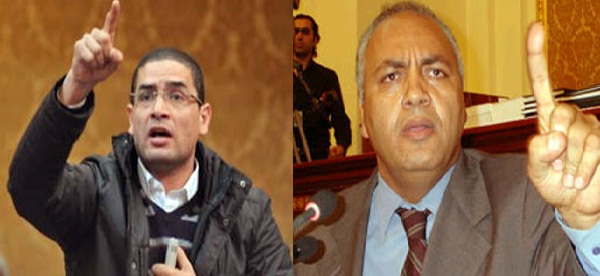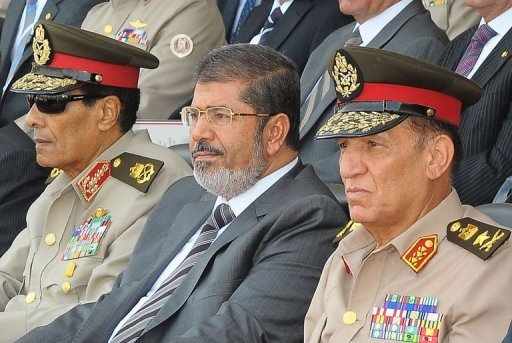عندما
تصل قوى غير ديمقراطية إلى السلطة عن طريق آليات ديمقراطية فإن أول ما يزعجها
ويكون ضحيتها هو حرية التعبير. هذا ما يحدث في مصر الآن، فبينما يتجه الرئيس المصري
الجديد محمد مرسي، المنتمي لجماعة الإخوان المسلمين، لإحكام سيطرته على السلطة، تسود
مخاوف من تقليص حرية التعبير في ظل ممارسات إخوانية للهجوم على الحريات العامة، وإعادة
انتاج ممارسات سلطوية، وهو ما يعد مؤشرا على أن مصر انتقلت من شمولية عسكرية إلى
شمولية دينية.
فخلال
الأيام القليلة الماضية كانت انتهاكات حريات التعبير هي العنوان الأبرز، من خلال
مطاردة الصحفيين وقمع المظاهرات السلمية. وقدم محاموا الجماعة بلاغات للنيابة استنادا لترسانة القوانين المقيدة للحريات المورثة من عهد مبارك، والتي لم يتم تعديلها قبل حل مجلس الشعب ذو الأغلبية الإسلامية. وتم التحقيق مع رؤساء تحرير، الدستور والفجر
وصوت الأمة، وسجن رئيس تحرير الدستور إسلام عفيفي على ذمة التحقيق، إلى أن قرر
مرسي إلغاء عقوبة الحبس الإحتياطي للصحفيين في قضايا النشر، وبالرغم من أن البعض
استقبل هذا القرار بالترحيب، إلا أنه يعيدنا إلى الممارسات الازدواجية التي تحاول
أن تظهر الرئيس بمظهر الحاكم العادل، في حين تقوم الجماعة بالانتهاكات على الأرض.
لم تكتف الحكومة الإخوانية باللجوء للقضاء فقط وإنما جرى اتخاذ قرارات
إدارية منها قرار الهيئة العامة للاستثمار بوقف بث قناة "الفراعين"
الخاصة لمدة 45 يوم وتوجيه إنذار لها بسحب ترخيصها إذا استمرت تجاوزاتها، فضلاً عن تهديد وزير الاستثمار بسحب ترخيص
القنوات التليفزيونية الخاصة التي تبث ما أسماه "شائعات".
وحاصر شباب الإخوان مدينة الإنتاج الإعلامي للاعتداء على صاحب قناة
الفراعين توفيق عكاشة الذي تمكن من الفرار، بينما تم الاعتداء على الكاتب
الصحفي خالد صلاح، وتكسير سيارته. وقبل
ذلك تم الاعتداء بالسب علي المحامي والناشط الحقوقي نجاد البرعي ورشه بالمياه
لموقفه الرافض لقرار عودة البرلمان. والإعتداء بالضرب على المهندس حمدي الفخراني
عضومجلس الشعب السابق، أثناء خروجه من مبنى مجلس الدولة بسبب رفضه للقرار نفسه.
وجاء تعيين رؤساء تحرير جدد للصحف القومية ليؤكد المخاوف، فعدد كبير ممن تم تعينهم لم يُختاروا بناء على معايير الكفاءة المهنية، كما أدعى الإخوان المسلمون، بقدر قربهم من الجماعة. تأكدت المخاوف أكثر بعد أن بدأ رؤساء التحرير الجدد في منع نشر مقالات رأي تهاجم جماعة الإخوان المسلمين. مثل: منع مقالا يحمل عنوان "لا سمع ولا طاعة" فى جريدة الأخبار ليوسف القعيد. وأيضا منع نشر مقالا للكاتب والمحامى ثروت الخرباوى القيادى الأخوانى السابق حول الدولة المدنية فى الاسلام تحت عنوان " ليت الذين يحكموننا يفهمون" وعزز رؤساء التحرير الجدد الانطباع بأن شيئا لم يتغير في تسخير الصحف، التي هي ملك الشعب، لخدمة الرئيس ونفاقه.
وجاء تعيين رؤساء تحرير جدد للصحف القومية ليؤكد المخاوف، فعدد كبير ممن تم تعينهم لم يُختاروا بناء على معايير الكفاءة المهنية، كما أدعى الإخوان المسلمون، بقدر قربهم من الجماعة. تأكدت المخاوف أكثر بعد أن بدأ رؤساء التحرير الجدد في منع نشر مقالات رأي تهاجم جماعة الإخوان المسلمين. مثل: منع مقالا يحمل عنوان "لا سمع ولا طاعة" فى جريدة الأخبار ليوسف القعيد. وأيضا منع نشر مقالا للكاتب والمحامى ثروت الخرباوى القيادى الأخوانى السابق حول الدولة المدنية فى الاسلام تحت عنوان " ليت الذين يحكموننا يفهمون" وعزز رؤساء التحرير الجدد الانطباع بأن شيئا لم يتغير في تسخير الصحف، التي هي ملك الشعب، لخدمة الرئيس ونفاقه.
ودفعت تلك المؤشرات ثلاثين
منظمة مصرية تعنى بالصحافة والفنون، إلى، تأسيس "الحركة المصرية لحرية الرأي
والإعلام" ووصف بيان صادر عن تلك المنظمات الاعتداءات على حرية الرأي في إطار
"استخدام أساليب النظام البائد نفسها."
هناك
شعورا بأن لا شيء اختلف، فحزب الحرية والعدالة يكرر تجربة الحزب الوطني في
الانفراد بالسلطة ، ويبدو أن النظام في مصر يدور في نفس التوازنات الداخلية
والخارجية، والخطوط العريضة لاستراتجيات الدولة التي أرساها العسكر، فلا يلوح حتى
الآن في الأفق تغيرات جذرية من تلك التي تحدثها الثورات، فوررثة المنظومة الشمولية
هم أيضا شموليون.
وفي الوقت الذي يحاكم فيه صحفيين
وإعلاميين بتهم تتعلق بالتحريض وإهانة رئيس الجمهورية وترويج أخبار كاذبة، يتم التغاضي عن تجاوزات أكثر خطورة من قبل بعض
الإسلاميين مثل فتوى الشيخ هاشم اسلام، عضو لجنه الفتوي بالازهر الشريف، بوجوب قتل
المشاركين في مظاهرات
24 اغسطس ضد مرسي، باعتبار أنهم "خارجين علي ثوره
يناير" واتهمهم بجريمتي
"الخيانة العظمى لله والوطن ورسوله والمؤمنين، والحرابه الكبري".
من
حق الإخوان اللجوء إلى القضاء في حالة ما إذا رأوا في أي نقد "تطاولا"
لكن بعد أن يتم تنقية ترسانة قوانين مبارك من القوانين المقيدة لحرية التعبير بحيث
تتوافق مع المعاير الدولية في الحريات. فتهم مثل: إهانة رئيس الجمهورية، ترويج
أخبار كاذبة، تكدير السلم العام، الإساءة إلى الإسلام، لازالت سيفا مسلطا ضد حرية
التعبير، وتأكيد الرئيس مرسي على أنه سيواجه بالقانون "المتطاولون" يعني
أنه سيعود للممارسات النظام السابق في استخدام قانون جائر.
علينا
الانتظار لمعرفة الصياغات النهائية لبنود الحريات في الدستور الجديد، الذي يهيمن
الإسلاميين على صياغته، بالإضافة إلى انتظار ما إذا كان الرئيس سيتخذ خطوات لإيقاف
العمل بالقوانين المقيدة للحريات، وعلى أي حال فإن المؤشرات الأولية تشير إلى أن
الإعلام سيتعرض إلى محاولات مستمرة للسيطرة والتضيق على حرية التعبير نابعة من
عقلية شمولية لجماعة تربى أعضائها على قواعد السمع والطاعة، وتجد صعوبة في التعامل
في مناخ ديمقراطي، وهو ما سيخلق كثير من الصدمات مع المجتمع المدني. والأيام
القادمة تجعلنا في مفترق طرق ما بين إجبار الإخوان على احترام الحريات والتعديدية
أو فرض هيمنتهم واستكمال مشروعهم الأصلي في أسلمة الدولة. والضامن للالتزام
الإخوان بالديمقراطية هو استمرار حالة الزخم الثوري، وتكوين حزب مدني قوي يستطيع
أن يكون بمثابة البديل.








